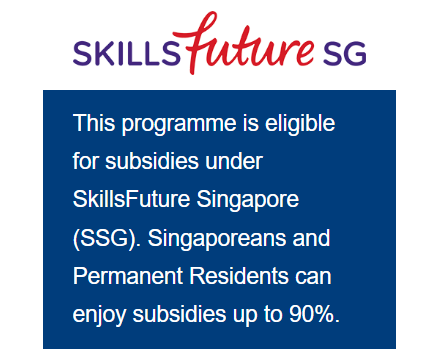Investors and regulators around the world are demanding companies to incorporate environmental, social and governance (ESG) factors into their strategies and practices. The growth in assets under management for ESG-focused funds have been steady in recent years. Effective ESG policies and practices will become more critical differentiating factors for a sustainable business. This course will strengthen the understanding and knowledge for businesses to make responsible and ethical reporting on the sustainability fronts that meet regulatory, investors' and consumers' expectations.
This course qualifies as part of a three-course requirement for the award of a NUS Professional Certificate in Managing Sustainability. The other two courses of the requirement for the certificate are Carbon Accounting for Enterprises and Sustainable Project Financing.
TOPIC COVERAGE
- Understand the key stakeholders and the importance of environmental, social and governance (ESG) factors to them
- Understand global, regional and local sustainability reporting frameworks, developments in sustainability reporting and responsible investing around the world
- Understand different ESG ratings systems and continuous efforts to develop a more robust ESG rating framework
- Be able to recommend policies and practices in key areas of corporate governance that are aligned with environmental and social considerations.
WHO SHOULD ATTEND:
This course is relevant for professionals who are driving sustainability transformation for their organizations or are looking to upskill and accelerate their career in the sustainability space. These typically include Chief Financial Officers, Chief Sustainability Officers, Chief Legal Officers, PR managers, entrepreneurs, business and organizational leaders, product & project managers, public policy makers, risk management officers, and consultants. In addition, as sustainability is increasingly incorporated in mainstream financial and investment practices, this course will be useful not only for sustainability professionals, but also for audit and compliance officers, business analysts, financial accountants, financial analysts, relationship managers and loan officers.
Our participants will learn essential concepts and tools to become better equipped in helping their companies identify the core areas to focus their efforts on in their sustainability journeys.
PRE-REQUISITES:
Basic understanding of financial concepts, as well as how companies operate within a competitive environment.
APPLICATION PROCESS:
- Participants are strongly advised to apply at least 1 month in advance. Applications received after the deadline will be considered based on space availability.
- Participants who attend all classes and pass assessment of the course will be awarded a Certificate.
COURSE FORMAT
Classroom (In-person)
COURSE INTAKE
26 - 27 Sep 2024
COURSE DURATION
2 days, 9am to 5.30pm
SKILLSFUTURE CODE
TGS-2023022208

FOR MORE ENQUIRIES:
contact us @ sgfin_education@nus.edu.sg
FEES & FUNDING
- This course is eligible for subsidies under SkillsFuture Singapore (SSG).
- Singaporeans and PRs can enjoy up to 90% subsidies.
- Singapore Citizens or PRs eligible for SSG grant must attain at least 70% training attendance and passed all prescribed assessments
| Self-Sponsored | SME (ETSS Scheme) Company-Sponsored | Non-SME Company-Sponsored | |
|---|---|---|---|
| Course Fees | S$2,071.00 | S$2,071.00 | S$2,071.00 |
| Singapore Citizens & PRs aged 21 years and above | S$621.30 | S$241.30 | S$621.30 |
| Singapore Citizens aged 40 years and above | S$241.30 | S$241.30 | S$241.30 |
COURSE INSTRUCTORS

NUS Business School, Department of Accounting
Mak Yuen Teen is Professor (Practice) of Accounting at the NUS Business School, National University of Singapore (NUS). He was a former Vice Dean of the School and the founder of the first corporate governance centre in Singapore at NUS. He holds first class honours, master and PhD degrees in accounting and finance, and is a fellow of CPA Australia.
Prof Mak served on three of the four corporate governance committees that developed and revised the code of corporate governance for listed companies, including the first committee in 2000 and the most recent committee which released the 2018 Singapore Code. He currently serves on the Corporate Governance Advisory Committee under the Monetary Authority of Singapore (MAS).
He was a member of the audit advisory committees of two UN funds based in New York over a 12-year period. He is currently a member of the international advisory board of the Hawkamah Institute of Corporate Governance in Dubai and a senior advisor of the Vietnam Independent Directors Association.
Prof Mak regularly conducts training for directors, regulators and other professionals. His recent reports and research cover topics such as linking ESG factors to executive remuneration, sustainability governance structures and practices, board oversight of climate risks and opportunities, materiality assessment of ESG factors, and sustainability assurance.

NUS Business School, Department of Accounting
Sa-Pyung Sean Shin is a Senior Lecturer of Accounting at the National University of Singapore. Dr. Shin holds a Doctor of Business Administration degree in Accounting and Management from Harvard Business School, a Master I degree in Economics from Toulouse School of Economics in France, and a Bachelor's degree in Business Economics with a minor in Accounting from UCLA.
In addition, Dr. Shin possesses the Fundamentals of Sustainability Accounting (FSA) Credential from the IFRS Foundation. His primary research interests lie in the areas of corporate governance and sustainability accounting.
Further, Dr. Shin is an active member of the IFRS FSA City Group Singapore, enriching his expertise and contributing to the ongoing discussions in sustainability accounting. Prior to joining NUS in 2021, he served as an Assistant Professor at Singapore Management University, where he taught courses on corporate reporting and financial analysis.
